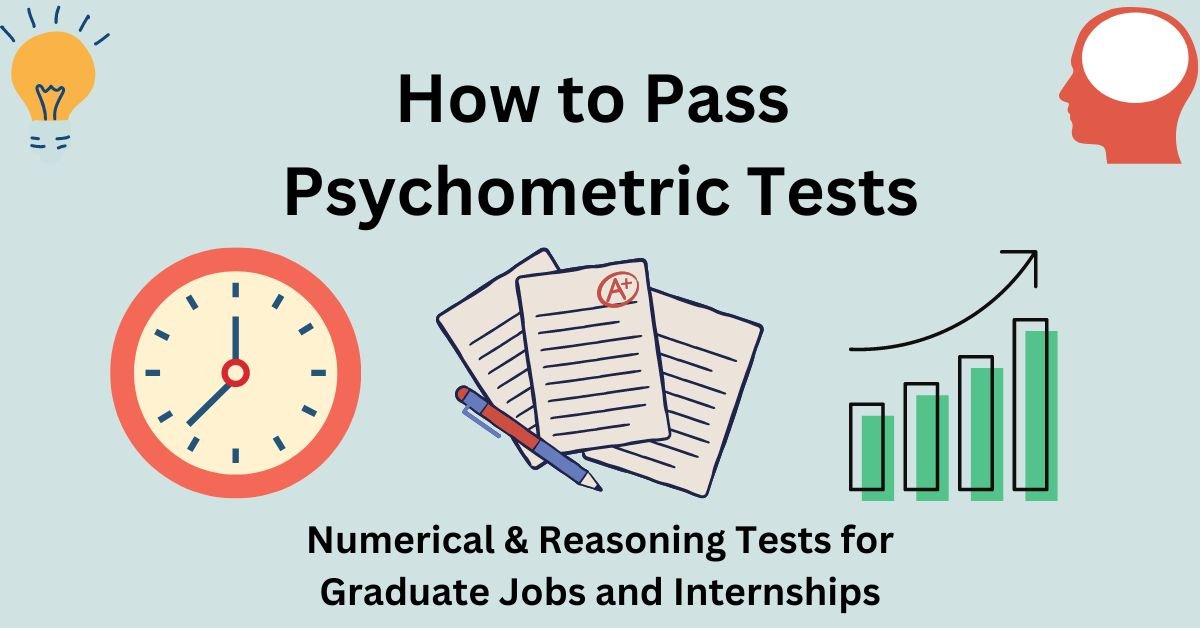Disclosure: The Graduate Samaritan is a free independent blog supported by its readers; this post may contain affiliate links that may earn a tiny commission to help the blog sustain itself, thank you for supporting this independent blog! (full disclaimer here)
Applying for graduate jobs or internships in the UK? We have made a guide that covers everything you need to know in order to pass psychometric tests (verbal, numerical, and reasoning— step-by-step.
Psychometric tests can seem scary — but with the right preparation and mindset, you can absolutely ace them! 🚀
🤔 What Are Psychometric Tests and Why Are They Used?
Psychometric tests help employers measure your abilities and personality during recruitment. They’re designed to check skills like:
- Logical problem-solving 🔎
- Numerical reasoning 💡
- Verbal understanding 🧠
- Behavioural fit 🤝
Companies love them because they save time and reveal who matches their culture and role requirements. The two most common types are:
- Reasoning Tests (verbal, logical, situational)
- Numerical Tests (maths-based problem solving)
🧠 How to Pass Reasoning Tests for Graduate Jobs
📝 Situational Judgement Tests (SJTs)
SJTs give you realistic work scenarios — and ask you to choose the best response.
Example Scenario:
A client emails complaining about a late project. Your manager is unavailable. What should you do?
Sample Responses:
- A) Wait for your manager’s return and then reply.
- B) Apologise and offer an updated timeline immediately.
- C) Escalate the issue to a different department.
✅ Correct approach: B — Shows initiative, accountability, and communication.
🧠 Top tips to succeed:
- Always pick responses showing professionalism, proactivity, and teamwork.
- Prioritise the client’s needs and business impact.
- Be honest! These tests check consistency across questions.
🗣️ Grammar-Based Reasoning Tests
Grammar reasoning tests assess your written communication in formal settings.
Example Question:
Choose the correct sentence:
A) The team is meeting tomorrow.
B) The team are meeting tomorrow.
✅ Answer: A — “Team” is a singular collective noun.
How to improve:
- Practise spotting tense, subject-verb agreement, and word choice errors.
- Read business-focused materials like the Financial Times or BBC News.
🚀 Cheat Sheet Tip:
Always double-check:
- Subject/verb agreement
- Consistent tense
- Correct prepositions
🎓 Bonus Tip: Psychometric Test Resource
🎧 Bonus Tip: Check out the latest Audible Offers — you might be surprised how much value is included! It’s a great time to explore audiobooks and podcasts, which discuss complex topics in clearer, non-academic language, making them easier to understand and less overwhelming.
Choose wisely — whether you use your picks for pleasure or personal growth is up to you, but we highly recommend making the most out of this resource.
Consider choosing audiobooks and podcasts on aptitude testing or the psychology of human resources — it’s a great way to gain valuable insights into psychometric assessments!
🎧 Audible – The Ultimate Study Hack!
- 📚 Listen to Textbooks & Study Guides anytime, anywhere.
- 🧠 Boost Focus with expert knowledge and productivity podcasts.
- 🎧 Relax & Unwind with bestselling audiobooks after classes.
- 🔥 Explore New Audiobooks Every Month with your membership!
📖 Verbal Reasoning Tests
Verbal reasoning tests check if you can interpret information under time pressure.
Example Mini-Test:
Text: “Most graduate employees at Company X receive training within the first six months.”
Statement: “All graduates receive training immediately after joining.”
✅ Answer: False — “Within six months” ≠ “immediately”.
Top Verbal Tips:
- Underline keywords when reading.
- Don’t infer! Only use information provided.
- Move quickly if you can’t decide — don’t waste time.
🔢 How to Pass Numerical Tests for Graduate Jobs
Numerical tests assess your speed and accuracy with data.
🏗️ Structure of Numerical Tests
- Easy warm-up questions first.
- Harder “trap” questions mid-test.
- Easier questions return toward the end!
🎯 Strategy: Don’t get stuck. Move past tough questions and finish the test.
🎯 Key Areas to Master
🔢 Percentages & Ratios
A product’s price drops from £80 to £60. What’s the percentage decrease?
Solution:
(80 – 60) ÷ 80 = 0.25 → 25% decrease
🔢 Data Interpretation
- Look at graphs and answer questions based only on the data shown.
- Common mistake: Reading assumed trends instead of actual figures.
🔢 Currency Conversion
£1 = $1.20. How much is £500 in dollars?
£500 × 1.2 = $600
🧠 Numerical Test Formula Cheatsheet:
- Percentage = (Difference ÷ Original) × 100
- Ratio: Simplify by dividing both sides by common factors
- Speed = Distance ÷ Time (for logical reasoning)
💸 Bonus Paragraph: The Best Student Discount!
Want to save money and enjoy exclusive student perks? Unlock big savings with Amazon Prime Student — you can get 6 months FREE!
And, if you love it (which you will), you can keep your Prime membership at half price until you graduate! 🎓
🎓 Amazon Prime Student: The Ultimate Uni Perk!
- 🚚 Free Next-Day Delivery
- 🎬 Amazon Prime Video
- 🎶 Prime Music
- 🎓 Student-Exclusive Offers
Sign up in minutes:
- Visit Amazon Prime Student.
- Click “Start Your 6-Month Trial”.
- Use your uni email address (.ac.uk).
- Confirm expected graduation year.
- Add payment details (don’t worry, first 6 months are free!)
- Enjoy your free benefits!
🧠 How to Prepare to Pass Psychometric Tests
Preparation = Confidence = Success.
Here’s your winning system to pass psychometric tests for internships and grad jobs:
✅ Practice Regularly
Use SHL, AssessmentDay, JobTestPrep and free mock sites. If you are not particularly good at maths, consider using guides like Numerical Reasoning Tests or Ultimate Aptitude Tests available on Amazon UK.
✅ Simulate Test Conditions
Use a timer 🕒, no distractions, and practice under time pressure.
✅ Review Your Mistakes
Focus most on areas you consistently miss.
✅ Manage Stress
Practice quick breathing exercises before starting:
- Inhale 4 seconds.
- Hold 4 seconds.
- Exhale slowly 6 seconds.
✅ Make a Realistic Study Plan
Example week:
- Mon: Situational Judgement
- Tue: Verbal Reasoning
- Wed: Numerical Reasoning
- Thu-Fri: Mock Tests
- Sat: Review Mistakes
- Sun: Rest & relax.
🚫 Practical Mistakes to Avoid
Top 5 Common Mistakes That Cost People Jobs:
- Overthinking SJTs instead of answering honestly.
- Spending too long on 1 tough numerical question.
- Not practising under time conditions.
- Guessing without reading carefully on verbal reasoning.
- Panicking mid-test and mentally giving up.
👉 Remember: the key to pass psychometric tests is not about being perfect — it’s about strategic performance!
✅ Free Study Checklist (Copy this for your wall!)
✅ Take 2 practice tests every day.
✅ Review 3 sample SJTs and study model answers.
✅ Focus 10 minutes daily on grammar mistakes.
✅ Practise speed maths drills for 5 minutes a day.
✅ Sleep 7–8 hours before the test.
✅ Breathe deeply 5 minutes before you begin.
🔗 Recommended: Check out our top picks for the Best Books to Build a Successful Mindset
🧠 FAQs About Passing Psychometric Tests
Most large companies have a cooling-off period (usually 6–12 months) before you can reapply — and they often reuse the same or similar tests.
If you’ve failed, reflect on where you struggled and use the time to upskill before trying again.
It depends on the employer. Some tests allow basic calculators, while others are strictly mental maths.
Always check the instructions beforehand, and practice both with and without a calculator to stay sharp.
Ideally, give yourself 2–3 weeks of consistent practice. If you’re short on time, even 5–7 focused days can make a difference — especially if you simulate test conditions and review mistakes carefully.
Time pressure is part of the challenge. Many tests are designed so not everyone finishes — the goal is quality over quantity.
Work efficiently, but don’t rush. If you’re stuck, skip and come back later if there’s time.
Most tests use a percentile system — meaning you’re compared to other candidates, not just judged on raw scores.
That’s why practice is key: even small improvements can put you in a higher bracket than your competition.
They’re similar in format, but graduate-level tests often have slightly higher difficulty or include more advanced business logic.
Regardless of level, the core skills are the same — so the prep you do now helps in both.
Absolutely.
Finance & Consulting roles often prioritise numerical accuracy and logic.
Marketing & HR may place more weight on verbal reasoning and situational judgement.
Tech roles might skip psychometric tests altogether and go straight to coding or logic puzzles. Tailor your preparation based on the company and role.
Yes! AI can be a huge advantage — use it to:
Simulate test questions ✅
Explain difficult answers 🧠
Build study plans 📅
Get feedback on written responses or logic
Just make sure your actual performance reflects your learning — you can’t use AI during the real test!
🔗 Recommended: Graduating Soon? Treat yourself to a nice Graduation Gift!
🎓 Conclusion: You’ve Got This!
Graduate job applications are tough — but every single test, every single attempt makes you stronger. 💪
- Prepare smart.
- Practise daily.
- Stay calm.
- Keep learning.
With the right strategies and mindset, you will pass those psychometric tests and land that dream job or internship! 🚀
If you are looking for more career guidance, we wrote other guides that you might find useful:
- How to Make the Most Out of Your Placement or Internship.
- How to Make a Good Student or Graduate LinkedIn Profile
Good luck! 🍀
🎓 University Essentials – Everything You Need for Uni
Did you know? We’ve put together tailored student essential lists to help you through every aspect of university life!
- 📝 Student essentials: Everything you’ll need to stay prepared, productive, and comfortable during a typical Uni day.
- 💡 Accommodation essentials: Make your space feel like home (and don’t forget the stuff everyone forgets!).
- 🖥️ Study from home essentials: Tools and tips to create a distraction-free, efficient study setup.
- 🥘 Kitchen essentials: From budget-friendly basics to smart cooking tools that make life easier.
- 🎧 Coolest gadgets for university: Level up your uni experience with tech and tools students actually use.
(Bonus paragraph) The Best Student Discount! 💸
Want to save money and enjoy exclusive perks? Unlock big savings with Amazon Prime Student, you can get 6 months FREE—and that’s just the beginning! Here’s what you’ll get with your free trial:
- 🚚 Free Next-Day Delivery on all your essentials—because who doesn’t love fast shipping?
- 🎬 Amazon Prime Video: Stream the latest films, TV shows, documentaries, and even live sports events.
- 🎶 Prime Music: Listen to ad-free music, playlists, and podcasts to stay focused while studying.
- 🎓 Student-Exclusive Offers: Get discounts on uni essentials, textbooks, and more.
And, if you love it (which you will), you can keep your Prime membership at half price until you graduate! 🎓
Ready to start? Follow this quick step-by-step guide to set up your Amazon Prime Student account:
- Visit the official Amazon Prime Student, landing page.
- Click on “Start Your 6-Month Trial” and then hit “Try Prime Student”.
- Sign in if you already have an account, or create one quickly.
- Enter your university email address (ending with .ac.uk).
- Provide your expected graduation year.
- Add your payment details (don’t worry, the first 6 months are totally FREE!).
- Verify your email (Amazon will send a confirmation to your uni address).
- Enjoy your Prime perks!
Don’t miss out on these incredible benefits—sign up today and get your free 6 months of Amazon Prime Student now!



